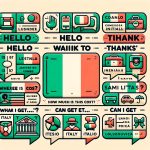When traveling to Italy, one of the most essential things to do is to familiarize oneself with some basic Italian phrases. Whether you’re ordering food at a local trattoria or asking for directions in the vibrant streets of Rome, knowing a few words in Italian can greatly enhance your travel experience. In this article, we will delve into the must-know Italian phrases that every traveler should have in their repertoire to navigate through the beautiful country effortlessly.
Italy’s rich culture and warm hospitality make it an attractive destination for tourists from around the world. However, not everyone in Italy speaks English fluently, especially in smaller towns or off-the-beaten-path locations. Therefore, having a basic understanding of Italian phrases is not just helpful but can also show respect towards the locals and their language. From simple greetings to ordering food and drinks, being able to communicate effectively can truly enrich your travel experience.
In addition to practical communication purposes, learning Italian phrases can also open doors to authentic cultural experiences. By engaging with locals in their native language, travelers can bridge cultural gaps and create meaningful connections. Understanding basic etiquette and slang expressions can further deepen your immersion into the vibrant Italian lifestyle. So let’s embark on this linguistic journey together and discover the key Italian phrases that will make your trip unforgettable.
Basic Greetings and Polite Phrases in Italian
When traveling to Italy, it is essential to have some basic greetings and polite phrases in your arsenal to help you navigate through daily interactions with locals. Whether you are ordering a cappuccino at a cafe or asking for directions on the street, knowing these Italian phrases can make your travel experience smoother and more enjoyable.
Common Greetings
One of the first things you should learn when visiting Italy is how to greet someone. A simple “Ciao” (hello) can go a long way in making a positive first impression. Other common greetings include “Buongiorno” (good morning), “Buona sera” (good evening), and “Arrivederci” (goodbye). Remember to always accompany these greetings with a smile for an added touch of warmth.
Polite Phrases
In addition to greetings, it is important to know some polite phrases in Italian to show respect and gratitude. When asking for something, remember to say “Per favore” (please) and “Grazie” (thank you) after receiving help. If you accidentally bump into someone or need to apologize, saying “Mi dispiace” (I’m sorry) will show that you are considerate of others. These small gestures can leave a big impact during your travels in Italy.
Essential Travel Phrases
To enhance your travel experience in Italy, there are a few must-know Italian phrases for travel that can come in handy. For example, knowing how to say “Dov’è il bagno?” (Where is the bathroom?) or “Quanto costa?” (How much does it cost?) can be lifesavers in certain situations. Being able to express yourself politely and confidently in Italian will not only help you communicate effectively but also create memorable interactions with locals throughout your journey.
Ordering Food and Drinks in Italian Restaurants
When traveling to Italy, ordering food and drinks in Italian restaurants is an essential part of the experience. Knowing some key phrases will not only help you communicate effectively but also show respect for the local culture. Here are some must-know Italian phrases for travel that will enhance your dining experience in Italy:
Basic Food Phrases
When you sit down at a restaurant in Italy, it’s important to know how to order your meal. Some basic food-related phrases you should learn include “Un tavolo per uno/due” (A table for one/two), “Il menù, per favore” (The menu, please), “Vorrei ordinare” (I would like to order), and “Il conto, per favore” (The check, please).
Common Food and Drink Items
Familiarizing yourself with common food and drink items in Italian can help you navigate the menu more easily. Some useful words to know include “Antipasto” (appetizer), “Primo piatto” (first course), “Secondo piatto” (second course), “Dolce” (dessert), “Vino rosso/bianco” (red/white wine), and “Acqua naturale/frizzante” (still/sparkling water).
Manners and Etiquette
In Italian culture, politeness is highly valued, especially when dining out. Remember to always say “Grazie” (Thank you) to show appreciation, and “Per favore” (Please) when making requests. It’s also customary to greet the waiter with a friendly “Buongiorno/Buonasera” (Good morning/Good evening) before placing your order. By using these simple phrases and gestures, you can enjoy a pleasant dining experience while visiting Italy.
Learning these essential phrases for ordering food and drinks in Italian restaurants will not only make your dining experience smoother but also allows you to immerse yourself more fully in the local culture. So next time you find yourself sitting down at a trattoria or ristorante in Italy, don’t forget to practice these must-know Italian phrases for travel.
Asking for Directions and Navigating Public Transportation
When traveling in Italy, asking for directions and navigating public transportation are essential skills to have. Whether you’re trying to find a famous landmark or figuring out how to get from one place to another, knowing some key Italian phrases can make your journey much smoother. Here are some must-know Italian phrases for travel when asking for directions:
- “Dove si trova il Colosseo?” – Where is the Colosseum located?
- “Come posso arrivare alla stazione ferroviaria?” – How can I get to the train station?
- “Mi scusi, dov’è la fermata dell’autobus?” – Excuse me, where is the bus stop?
Navigating public transportation in Italy can be intimidating, but with a few basic Italian phrases, you’ll be able to get around with ease. Here are some useful phrases for traveling on public transport:
- “Quanto costa un biglietto per andare al centro città?” – How much does a ticket cost to go to the city center?
- “A che ora parte il treno per Firenze?” – What time does the train to Florence depart?
- “Vorrei una mappa della metropolitana, per favore.” – I would like a subway map, please.
By familiarizing yourself with these must-know Italian phrases for travel when asking for directions and navigating public transportation, you’ll be able to explore Italy confidently and independently. Don’t hesitate to practice these phrases before your trip so that you can make the most of your travel experience in this beautiful country.
Shopping and Bargaining in Italian Markets
When visiting Italy, exploring the local markets is a must-do activity. From artisanal crafts to fresh produce, these markets offer a glimpse into Italian culture and provide the perfect opportunity to practice your bargaining skills. To make the most of your shopping experience, familiarize yourself with some essential Italian phrases that will come in handy when negotiating prices and interacting with vendors.
Here are some must-know Italian phrases for travel when shopping in Italian markets:
- “Quanto costa?” – How much does it cost?
- “Posso avere uno sconto?” – Can I have a discount?
- “Mi piace molto questo. Posso provarlo?” – I really like this. Can I try it on?
- “Accettate la carta di credito?” – Do you accept credit cards?
- “È possibile fare un pacchetto regalo?” – Is it possible to have a gift wrap?
By using these phrases, you can engage in conversations with vendors, show your interest in their products, and potentially secure a better deal. Remember that bargaining is common in Italian markets, so don’t be afraid to negotiate prices while maintaining a respectful and friendly demeanor.
Additionally, be mindful of cultural norms when shopping in Italy. It is customary to greet vendors with a “Buongiorno” or “Buonasera” depending on the time of day. Always remember to thank them with a “Grazie” after making a purchase or simply browsing their wares. These simple gestures go a long way in showing respect for local customs and enhancing your shopping experience.
Whether you’re looking for souvenirs or trying out delicious street food, having the right phrases at your disposal will make your interactions smoother and more enjoyable. So brush up on these essential Italian phrases before heading to the markets and immerse yourself in the vibrant atmosphere of Italy’s bustling marketplaces. Buon shopping.
Emergency Phrases and Important Vocabulary for Travelers
| Italian Phrase | English Translation |
|---|---|
| Aiuto. | Help. |
| Dov’è il pronto soccorso? | Where is the nearest emergency room? |
| Ho bisogno di un medico. | I need a doctor. |
In addition to emergency phrases, it’s crucial to learn some important vocabulary that might come in handy during your travels in Italy. Understanding these words will not only help you communicate better but also ensure that you can handle unforeseen circumstances with greater ease. Some key vocabulary words include “ospedale” for hospital, “farmacia” for pharmacy, and “polizia” for police.
Moreover, having a basic understanding of numbers and time expressions in Italian can prove to be extremely useful during emergencies. Being able to communicate what time it is or provide your contact number could expedite any necessary assistance. Learning phrases like “Che ora è?” (What time is it?), “Mi chiamo ” (My name is ), and “Numero di telefono” (Phone number) can assist you greatly in urgent situations while traveling in Italy.
By familiarizing yourself with these emergency phrases and important vocabulary before your trip, you will not only feel more confident but also be better prepared to handle any unexpected events that may arise. Whether seeking medical help or contacting authorities, having an understanding of these essentials will undoubtedly enhance your overall travel experience in Italy.
Cultural Tips and Etiquette in Italy
Italy is a country rich in culture, history, and traditions, making it a fascinating destination for travelers. Understanding the cultural tips and etiquette in Italy can enhance your travel experience and help you connect with locals on a deeper level. One of the most important aspects of Italian culture is respect for traditions and social customs. When visiting Italy, it is essential to be aware of certain cultural practices to show respect for the local way of life.
One key cultural tip in Italy is the importance of greetings. Italians value polite manners and are known for their warm and friendly demeanor. When meeting someone for the first time, it is customary to shake hands and make eye contact. Learning basic greetings such as “buongiorno” (good morning), “buonasera” (good evening), and “arrivederci” (goodbye) can go a long way in establishing a positive rapport with locals.
Another aspect of Italian etiquette to keep in mind is dining customs. Italians take their food seriously and mealtimes are considered sacred moments to savor delicious dishes and enjoy the company of others.
When dining at a restaurant, remember to greet the staff with a friendly “buonasera” or “buon appetito” before starting your meal. It is also customary to wait for everyone at the table to be served before eating, as well as to leave a small tip if service was satisfactory.
Understanding these cultural tips and etiquette in Italy can help you navigate social interactions smoothly and show respect for Italian customs. By learning these key phrases and behaviors, you can immerse yourself more fully in the vibrant Italian culture and create memorable experiences during your travels.
| Italian Phrase | English Translation |
|---|---|
| Buona giornata. | Have a good day. |
| Grazie mille | Thank you very much |
| Quanto costa? | How much does it cost? |
Fun and Useful Italian Expressions to Impress the Locals
When traveling to Italy, it’s not just important to know basic Italian phrases for communication, but also fun and useful expressions that can help you connect with the locals and immerse yourself in the culture. By impressing Italians with some charming expressions, you can make your trip even more memorable and enjoyable. Here are some must-know Italian phrases for travel that will surely make a good impression:
One of the most essential expressions to impress Italians is “Grazie mille” which translates to “Thank you very much”. This simple phrase shows gratitude and appreciation, which is highly valued in Italian culture. Another fun expression is “Mi casa es su casa” which means “My house is your house”. Using this phrase when interacting with locals shows hospitality and friendliness.
If you want to show enthusiasm or excitement, you can use the popular Italian expression “Che bello.” which means “How beautiful.”. This phrase can be used to express admiration for something or someone. Additionally, if you want to cheers or toast with locals while enjoying a glass of wine, you can say “Salute.” which means “Cheers.”. Italians love to celebrate and share moments together, so using this expression will definitely impress them.
To add a touch of authenticity to your conversations, learn some Italian slang such as “Ciao bella/o” which translates to “Hello beautiful/handsome”. This casual greeting is commonly used among friends or acquaintances.
You can also try saying “In bocca al lupo” which means “Into the wolf’s mouth”, a way of wishing good luck in a more unique manner. Learning these fun and useful Italian expressions will not only help you connect with locals but also make your travel experience in Italy more enjoyable and engaging.
Conclusion
Learning essential Italian phrases for travel is crucial for a successful and enjoyable trip to Italy. By mastering basic greetings, ordering food, asking for directions, and navigating public transportation in Italian, travelers can enhance their overall experience and make meaningful connections with locals. These phrases not only help to facilitate communication but also show respect for the Italian culture and language.
In addition to practical benefits, knowing key Italian phrases can also make travelers feel more confident and comfortable during their trip. From shopping in Italian markets to handling emergencies or simply impressing locals with fun expressions, having a grasp of the language can open up doors to new experiences and opportunities. It allows travelers to immerse themselves more fully in the rich culture of Italy and connect with its people on a deeper level.
Ultimately, taking the time to learn must-know Italian phrases for travel is a sign of respect towards the country you are visiting. It shows an appreciation for the local customs and traditions, as well as a willingness to engage with the community in a meaningful way.
Whether you’re exploring historical sites, savoring traditional dishes, or simply strolling through picturesque streets, speaking even just a few words in Italian can truly enrich your travel experience and leave you with lasting memories of your time in Italy.
Frequently Asked Questions
How to Learn Italian Phrases for Travel?
Learning Italian phrases for travel can be a fun and practical way to enhance your experience in Italy. One effective method is to start with basic greetings like “ciao” for hello and “grazie” for thank you. Using language apps, watching Italian movies, or taking a beginner’s course can also help you pick up common phrases quickly.
What Is the Most Popular Phrase in Italy?
The most popular phrase in Italy is arguably “Ciao Bella!” which means “Hello beautiful!” This term of endearment is often used to greet someone in a friendly and charming way. It reflects the warm and expressive nature of Italian culture, where compliments are commonly exchanged between friends and strangers alike.
How Do You Say Good Trip in Italy?
To say “buon viaggio” in Italy is the equivalent of wishing someone a good trip. It’s a courteous way to send off someone on their journey, whether it’s for business or pleasure. Italians value manners and politeness in social interactions, so using this phrase shows consideration for the traveler’s well-being and safety.

I’m a passionate traveler, writer, and Italophile. My fascination with Italy’s history, art, and culture has led me on countless adventures across the Italian landscape. Through “I Live Italy,” I share my love for this extraordinary country and aims to inspire others to explore its boundless beauty.





